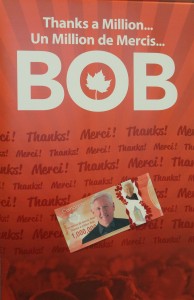Every political commentator loves to say “timing is everything in politics”, and every Canadian political commentator loves to say that Bob Rae never had good timing. He had the misfortune of becoming Premier before he was ready to govern, and had the misfortune of governing during a recession. His “second career” is often portrayed as a string of disappointments. He fell short in ’06. Two years later, he was forced out of the leadership race by his old roommate after a series of bizarre events. When he thought about running for leader again, the Justin Trudeau phenomenon was standing in his way.
Rae echoed this sentiment in his farewell speech Saturday, ruefully admitting: “I always wanted to be leader of the Liberal Party in the worst way. And it looks like I got my wish.” But if recent history is any indication, it could have gone a lot worse.
Rae has been praised far and wide over the past two weeks, for his steady leadership during a turbulent period. Even the Sun has had nice things to say about him. Compare that to the treatment of his predecessors who are still punchlines on 22 Minutes and Twitter. At the Dion tribute in 2009, half the delegates walked out early to visit hospitality suites. Ignatieff’s tribute in 2012 was met with only polite applause, mostly out of a sense of pity.
Rae got to lead nearly as long as Dion or Ignatieff, and he will be remembered as the man who kept the Liberal Party relevant during its darkest hour. He can now transition to the role of respected elder statesman, and will always be welcome to stop by and play the piano at fundraisers. That may not have been the outcome he hoped for, but it sure beats being known as the guy who lost – or the guy who tore the party apart by running for leader after promising not to.
No doubt, Rae is confident the Liberals would have performed better under his leadership. That may be true, but anything less than victory would have been seen as a failure, and it seems unlikely he could have dethroned Harper in an election fought squarely over the economy.
When Rae did win, in 1990, he left reviled, with his name a dirty word. That alone should be evidence enough that, sometimes, you’re better off not winning. Now, two decades later, Rae exits the stage his reputation restored, primarily because he didn’t win.
In some respects, his timing was perfect.

One response to “Rae’s Day”
I’ve said it before, and I’ll say it again: Bob Rae got a bad rap for “Rae Days”. And it was mostly from the unions that were putatively supporting the New Dems!
As you noted, Rae became premier on the eve of a recession. His options,wrt government employees, were limited. So, instead of actually throwing people out of work (how would the unions have liked THAT, I wonder?), he established “Rae Days” that provided for additional days off work…without pay.
What it did is spread the pain around relatively equally, as opposed to just those who were too junior (in terms of workplace seniority) to keep a position.
Apparently the notion of solidarity (sharing the burden) within the union ranks was too radical for the civil service unions. And I’m pretty sure that if the Liberals or Conservatives of the day had been in power, their “solutions” would have been a lot more draconian!